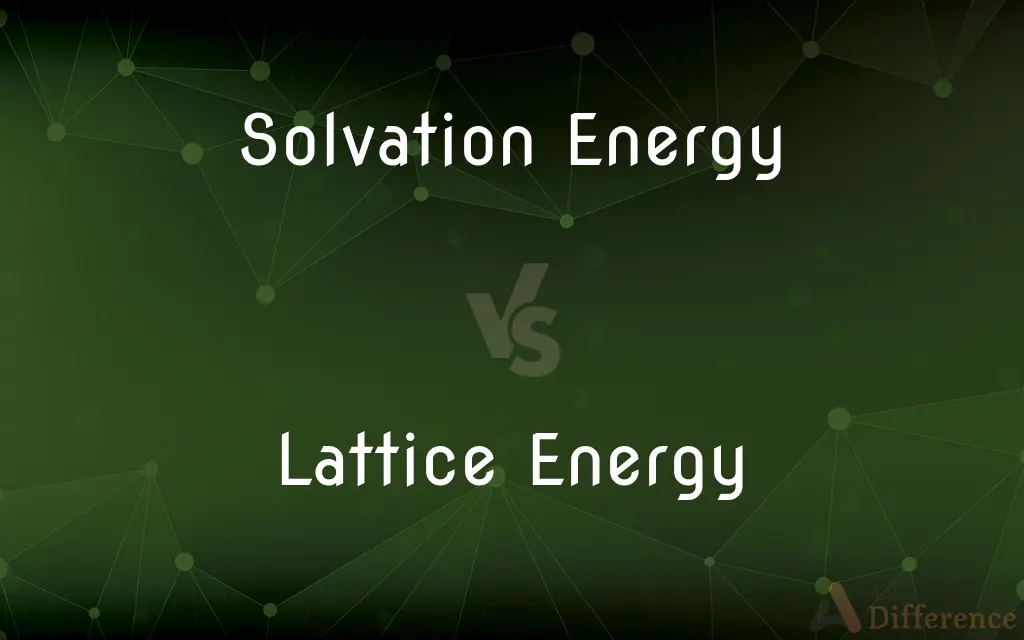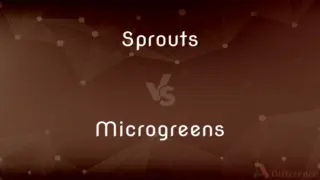Solvation Energy vs. Lattice Energy — What's the Difference?
By Fiza Rafique & Maham Liaqat — Published on August 6, 2024
Solvation energy is the energy released when solute particles are surrounded by solvent molecules, whereas lattice energy is the energy required to separate an ionic compound into its gaseous ions.

Difference Between Solvation Energy and Lattice Energy
Table of Contents
ADVERTISEMENT
Key Differences
Solvation energy refers to the energy change that occurs when a solute dissolves in a solvent, leading to the formation of a solution. This process involves the breaking of intermolecular forces within the solvent and the solute, and the formation of new interactions between the solute particles and the solvent molecules. On the other hand, lattice energy is defined as the amount of energy required to separate one mole of a solid ionic compound into its gaseous ions. It's a measure of the strength of the bonds that hold the ionic compound together.
While solvation energy can be exothermic or endothermic depending on the interactions between the solute and solvent, lattice energy is always endothermic because it involves overcoming the electrostatic forces holding the ions together. Solvation energy plays a crucial role in determining the solubility of a compound in a particular solvent, whereas lattice energy is key to understanding the stability and melting point of ionic solids.
The magnitude of solvation energy varies with the polarity of the solvent and the nature of the solute, with stronger solute-solvent interactions resulting in higher solvation energies. In contrast, the magnitude of lattice energy depends on the charge and size of the ions that make up the ionic compound; higher charges and smaller ionic radii lead to larger lattice energies.
Solvation energy is important in fields such as chemistry and biology where solutions and mixtures are common, influencing processes like drug delivery and enzyme activity. Lattice energy, however, is more relevant in the study of solid-state physics and materials science, affecting the physical properties of ionic compounds like hardness, brittleness, and electrical conductivity.
In practical applications, solvation energy is considered in the design of solvents for chemical reactions and extractions, optimizing the solubility of reactants and products. Lattice energy, on the other hand, is taken into account when designing ionic compounds for specific purposes, such as high-strength materials or ionic conductors for batteries.
ADVERTISEMENT
Comparison Chart
Definition
Energy change when a solute is dissolved in a solvent.
Energy required to separate an ionic compound into gaseous ions.
Nature
Can be exothermic or endothermic.
Always endothermic.
Depends on
Polarity of solvent, nature of solute.
Charge and size of ions in the compound.
Significance
Influences solubility and interaction strength between solute and solvent.
Affects stability, melting point, and physical properties of ionic solids.
Relevance in Disciplines
Chemistry, biology for understanding solution behavior and mixture processes.
Solid-state physics, materials science for studying and designing materials with specific properties.
Compare with Definitions
Solvation Energy
Influenced by the solvent's polarity and the solute's molecular structure.
Solvation energy is higher when a polar solute dissolves in a polar solvent due to stronger electrostatic interactions.
Lattice Energy
Involves the absorption of energy to overcome electrostatic forces.
Separating the ions in calcium fluoride requires a significant amount of lattice energy due to strong ionic bonds.
Solvation Energy
A key factor determining a substance's solubility in a given solvent.
A high solvation energy generally indicates good solubility of a solute in a solvent.
Lattice Energy
Depends on the charges of the ions and the distance between them.
Lattice energy increases with the ionic charge and decreases as ionic radii increase.
Solvation Energy
Important in designing effective solvents for chemical reactions and extractions.
Solvation energy considerations are crucial in selecting solvents for pharmaceutical compound formulations.
Lattice Energy
The energy required to separate an ionic compound into its individual gaseous ions.
The lattice energy of sodium chloride reflects the strength of the electrostatic attraction between Na+ and Cl- ions.
Solvation Energy
The energy change associated with the dissolution of a solute in a solvent.
When salt dissolves in water, solvation energy is released as water molecules surround and stabilize the sodium and chloride ions.
Lattice Energy
Affects melting point, hardness, and stability of ionic compounds.
A high lattice energy correlates with a higher melting point and greater stability of an ionic solid.
Solvation Energy
Can either release energy (exothermic) or absorb energy (endothermic).
The dissolution of sodium chloride in water is exothermic, releasing solvation energy.
Lattice Energy
Relevant in the development of materials with specific physical properties.
Lattice energy considerations are essential in creating ceramics and other materials that require high thermal stability.
Common Curiosities
What factors affect lattice energy?
Lattice energy is influenced by the ionic charges and the sizes of the ions.
Can solvation energy be both exothermic and endothermic?
Yes, depending on the nature of the solute and solvent, solvation energy can be either exothermic or endothermic.
What is solvation energy?
Solvation energy is the energy change occurring when a solute dissolves in a solvent.
How is lattice energy defined?
Lattice energy is the energy needed to separate an ionic compound into its ions in the gas phase.
What role does solvation energy play in biological systems?
It is crucial in processes like drug delivery and enzyme activity, where solute-solvent interactions are key.
Why is solvation energy important in chemistry?
It determines the solubility of substances and influences the behavior of solutions.
How do temperature and pressure affect solvation energy?
Changes in temperature and pressure can alter solvation energy, affecting solubility and dissolution rates.
How is lattice energy calculated?
Lattice energy is often calculated using the Born-Haber cycle or estimated from ionic radii and charges.
Can lattice energy predict the solubility of ionic compounds?
Indirectly, as compounds with high lattice energy tend to be less soluble in polar solvents.
Does the polarity of the solvent affect solvation energy?
Yes, solvation energy is higher in polar solvents for polar solutes due to stronger interactions.
Why is lattice energy crucial in materials science?
It helps in designing ionic compounds with desired thermal and mechanical properties for various applications.
How does lattice energy affect an ionic compound's properties?
It impacts the compound's melting point, stability, and physical characteristics.
What is the practical application of understanding solvation energy?
It aids in the design of pharmaceuticals, chemical synthesis processes, and material selection.
What is the relationship between lattice energy and ionic bond strength?
Higher lattice energy indicates stronger ionic bonds within the compound.
Is solvation energy relevant for all types of solvents?
Yes, it is relevant for both polar and non-polar solvents, though the effects and magnitudes differ.
Share Your Discovery

Previous Comparison
Sprouts vs. Microgreens
Next Comparison
Graphic Card vs. Video CardAuthor Spotlight
Written by
Fiza RafiqueFiza Rafique is a skilled content writer at AskDifference.com, where she meticulously refines and enhances written pieces. Drawing from her vast editorial expertise, Fiza ensures clarity, accuracy, and precision in every article. Passionate about language, she continually seeks to elevate the quality of content for readers worldwide.
Co-written by
Maham Liaqat











































